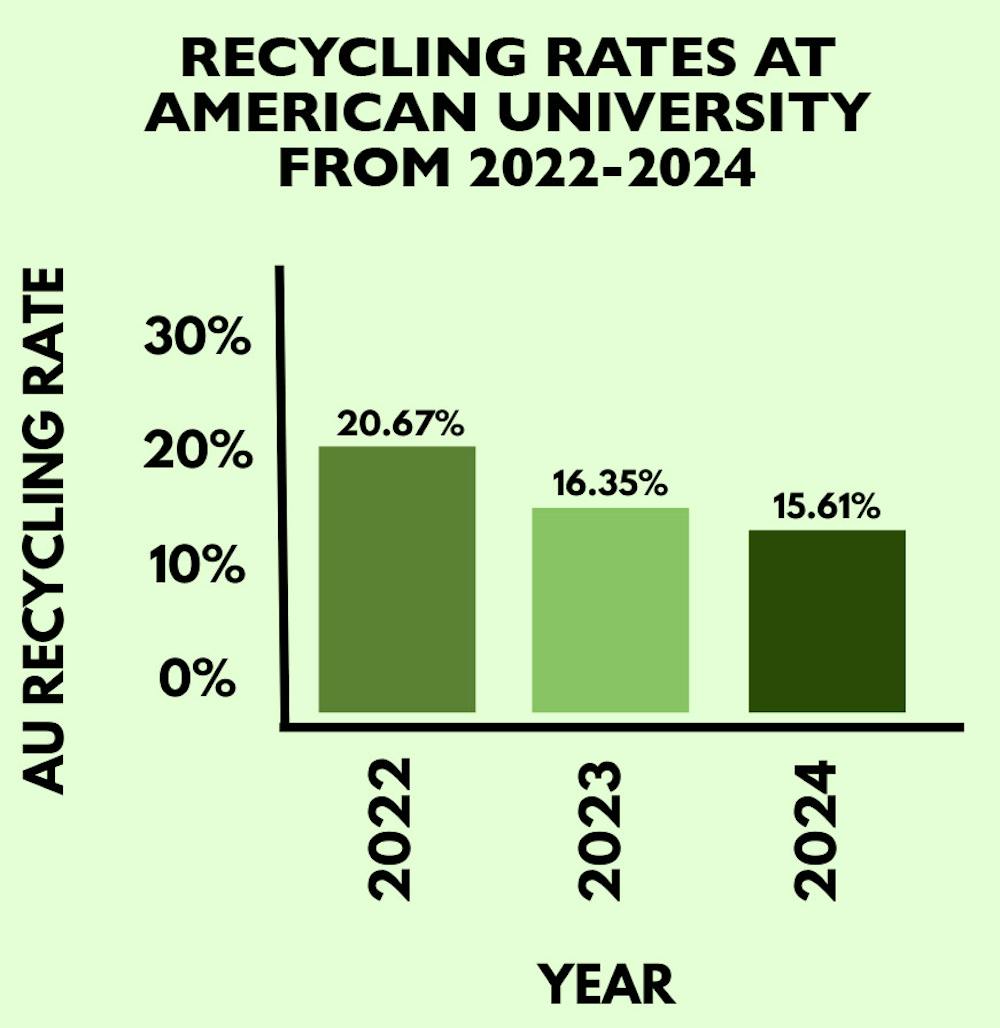Students, staff and faculty recycled and composted slightly less waste than previous years in the “Campus Race to Zero Waste,” a national competition which ranks universities across four waste categories.
In the competition’s Diversion category, which measures pounds of recyclable and compostable materials collected that don’t go to landfills, AU’s first seven weeks had a diversion rate of 15.61 percent and is ranked in 60th place out of the 65 universities as of Friday at 5 p.m., according to the Race database.
In 2023, AU had a diversion rate of 16.35 percent and in 2022, it was 20.67 percent, according to the Race’s 2023 and 2022 diversion reports.
In the eight-week competition, people recycled or composted 80,437 pounds of waste, according to AU’s sustainability website. The remaining 427,568 pounds AU generated between Jan. 28 and March 23 were sent to landfills.
The amount of food organics AU has collected is not listed on AU’s sustainability website, but that weight is part of the University’s diversion rate of 15.61 percent, according to the Race’s website.
AU did place fifth out of 85 universities in the Food Organics category, though, with 80.34 points, as of Friday at 5 p.m., according to the Race database. In 2023, AU was ranked second place instead of fifth place, according to the Race’s past results page, and in 2022, AU was ranked tenth place, according to the Race’s historical database.
In the Per Capita category, the average AU student and staff member recycled 2.89 pounds of waste, as of Friday at 5 p.m., according to the Race database. That placed the University in 58th place out of the 79 universities competing in the category. In 2023, the average student and staff member recycled 4.11 pounds of waste. In 2022, it was 4.58 pounds per capita.
Prior to 2022, AU hadn’t participated in the Race since 2014.
For this year’s race, the Office of Sustainability taught community members about the process of mitigating waste, hoping they’ll share zero waste practices with others, Sustainability Director Megan Litke said. The Office also assessed and improved the AU community’s actions to reduce waste.
“Overall, it gives us a really great opportunity to take a deeper look at our waste process throughout campus and explore where we have opportunities to improve and opportunities to celebrate,” Litke said.
Litke said this year’s scores were similar to previous years.
“It is a little bit less, but it’s still in the same ballpark,” she said.
Zero Waste Manager Caroline Boone also worked to educate people on compostable and recyclable materials in D.C. Students coming from around the world made that challenging, she said.
“One of the biggest hurdles with university sustainability and waste management is that people are coming from all different places,” Boone said. “So getting everyone to learn new systems and learn one system is an added hurdle.”
Items like cans, bottles, aluminum foil and sticky notes should be recycled, according to AU’s sustainability website. Items like food, pizza boxes and tissues should be composted, according to AU’s sustainability website. Other items like food wrappers, straws and plastic cutlery should be trashed, according to AU’s sustainability website.
Sorting materials correctly had the possibility to increase AU’s diversion rate from 15 percent to above 60 percent, Litke said, adding that the remaining 40 percent of material has to go to landfills due to waste management limitations.
The competition also didn’t count material disposed of in private areas, Litke said.
According to Litke, AU Sustainability staff shared sustainability information via social media and with professors to encourage zero waste practices. They also hosted “Race to Zero Waste” events in January, February and March.
Hannah Tverberg, a freshman in the School of International Service, said she saw waste management posts on the Office of Sustainability’s Instagram and appreciated having easy access to compost opportunities.
“I love seeing in the bathrooms that the paper towels are composted, that food from TDR is composted,” she said. “That makes me feel really good that AU is taking those steps to help the environment.”
To Tverberg, AU’s low scores in the competitions are odd, considering the school’s other sustainability efforts.
“I’m kind of surprised hearing that it’s ranked so low, especially when it’s done so many other measures to be so sustainable,” Tverberg said. “That’s honestly really surprising to me.”
Freshman Eleanor Ragle, a student in the School of Public Affairs, said AU’s participation in the Race could give people needed encouragement to recycle and compost.
“It seems like a pretty cool thing if we’re trying to do good,” Ragle said. “This is a fun way to build the desire to do that or encourage schools to take part in such an endeavor.”
For Ananya Nadgauda, a freshman in the School of Communications, the solution is using more reusable and non-disposable materials.
“I feel like that onus is more on students to be more responsible about how they’re consuming stuff,” Nadguada said. “Just don’t take more food than you can eat or don’t load up on disposable things that you’re just going to trash and then make it harder for them to be recycled properly.”
AU wasn’t the only university trying to encourage more reusable items and proper disposal of items, either. George Washington University’s Office of Sustainability also promoted recycling and composting methods for their participation in the Race.
GW Sustainability Associate Colin O’Brien said promoting waste management via a newsletter and inviting students to play waste-sorting games for Whole Foods giveaways was successful.
“It’s the little incentives that we’re doing to help people get in the right mindset during this time of the year,” O’Brien said.
GW Sustainability interns also documented their waste habits and shared tips with the audience on the Sustainability at GW Instagram page between Feb. 13 and March 5, according to O’Brien.
Meanwhile, AU’s Office of Sustainability worked to remind people about the importance of zero waste, according to Boone.
“From what we’ve seen, people do care and people do understand that it is important and believe that it is important,” Boone said. “But often [there] is that sort of disconnect, and figuring out how to bridge that gap is a big thing that we’re working on.”
Part of that, Boone said, is helping people realize their zero waste efforts amount to change.
“Especially here at American, where we work really hard to make sure we know exactly where all of our waste streams are really going, individual actions as far as waste-sorting really do matter,” Boone said.
Litke said that the competition can teach people about how their actions matter. In turn, she said, the community as a whole will learn how to best achieve zero waste.
“If we can grow the number of students who understand the process and understand their relationship to it,” Litke said. “Then they’ll share that with their friends and their peers.”
Correction: A previous version of this article misstated AU’s rank and number of competing universities for the Diversion and Food Organics categories and misattributed AU’s 2023 Food Organics ranking. The article has since been updated, noting AU ranked 60th place of 65 universities in the Diversion category, 58th place of 79 universities in the Per Capita category and attributing AU’s 2023 Food Organics categories to the Race’s past results page.
This article was edited by Clair Sapilewski, Sara Winick and Abigail Pritchard. Copy editing done by Luna Jinks and Charlie Mennuti.





